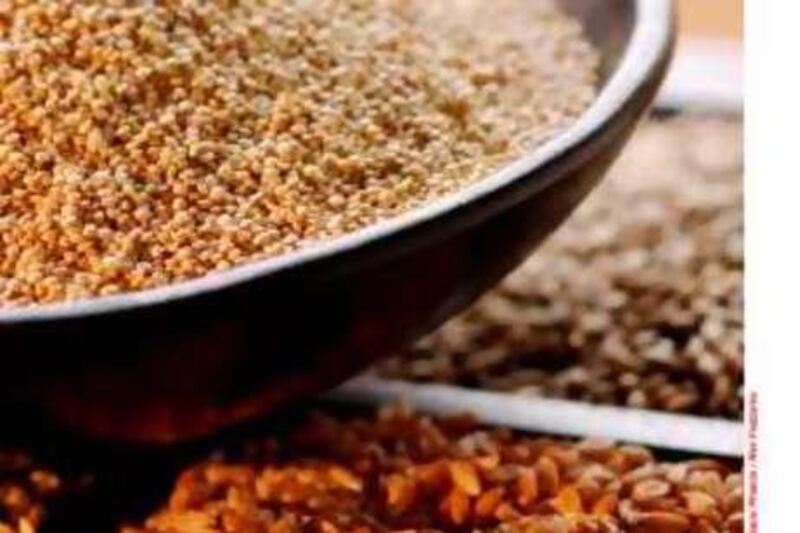As the new year starts, there is no better time to review your diet. It can be tempting at this time of year to make drastic changes to your eating habits, but a more sustainable approach is to introduce a few healthy alternatives to less beneficial foods. Take these 10 superfoods, for instance.
Chickpeas, or garbanzo beans, are high in protein, fibre and folate, a nutrient needed for the production of red blood cells. A study published in the Archives of Internal Medicine in 2001 found that adults who consumed legumes (such as beans and lentils) four times per week had a 22 per cent lower risk of developing coronary heart disease, and an 11 per cent lower risk of developing cardiovascular disease than those who consumed them once a week. A 175ml serving of cooked chickpeas provides less than 200 calories, 3g of fat, 11g of protein and 6g of fibre.
Quinoa (pronounced "keen-wa") is an ancient food from South America. It is often thought of as a grain, but is, in fact, the seed of a plant called chenopodium quinoa, related to beetroot, chard and spinach. Quinoa has a higher protein content than any grain, is low in fat and high in fibre. It takes 15 minutes to cook and can replace rice in many dishes. A 125ml serving of cooked quinoa provides about 110 calories, 4g of protein, 3g of fibre and less than 2g of fat.
Dates are a good source of potassium - a mineral that helps keep blood pressure in check - and fibre, which lowers cholesterol, decreases the risk of some cancers, aids weight loss and also plays a role in the prevention of type 2 diabetes. Men need 38g of fibre per day and women 25g. A serving of dried dates, equivalent to a small handful, has 4g of fibre.
While all cooking oils provide the same amount of calories and fat (about 120 calories and 14g of fat per tbsp), the type of fat contained sets them apart. Olive oil is an exceptional source of heart-healthy monounsaturated fatty acids, as well as being a source of vitamin K and vitamin E. What's more, a recent study published in the journal Cell Metabolism found that oleic acid, a type of monounsaturated fat found in olive oil may actually play a role in suppressing appetite. Replace unhealthier fats and oils in your diet, like butter, ghee or coconut oil with olive oil. If you're adding olive oil to your diet, be sure to remove calories elsewhere otherwise you'll gain weight since it's a concentrated source of calories.
Recent research has shown that pomegranate juice is a potent source of antioxidants. Preliminary studies have also shown that drinking pomegranate juice may not only reduce cholesterol, but also help fight prostate cancer. A whole piece of fruit is generally healthier thanfruit juice, but pomegranates may be the exception. All of the research into the fruit's health benefits has been based on its juice. Look for 100 per cent pure pomegranate juice with no added sugar to reap the most benefits from this colourful fruit. An appropriate serving is 125 ml.
These vegetables are not always popular, but they are nutrient powerhouses. The operative word here is dark. Go for spinach, kale, rapini and turnip greens, which are all are bursting with vitamins A, C, K, folate, iron and potassium. Aim to get at least one serving (32g) of dark leafy vegetables per day.
Sweet potatoes, like other orange vegetables, are an excellent source of beta-carotene. Beta-carotene is a powerful antioxidant that is converted into vitamin A in the body and is important for vision, bone development and the immune system. Of all the orange vegetables, sweet potatoes lead the pack in terms of beta-carotene content. As beta-carotene is a fat-soluble compound, a little added fat aids absorption. Try roasted sweet potatoes with a drizzle of olive oil. Aim to get at least one serving (70g) of orange vegetables per day.
These small, reddish-brown seeds are high in alpha-linolenic acid (ALA), a type of omega-3 fatty acid that boosts heart health. They also contain soluble fibre, which lowers cholesterol and helps keep blood glucose levels in check. Ground flax seeds are best. Due to their hard shell, whole seeds can pass through the body without being properly digested. Grind in a coffee grinder, blender or food processor and add to cereals, casseroles or baked goods.
Almonds are all-star nuts, thanks to their high levels of antioxidant vitamin E. They are also a good source of protein and fibre. As with all nuts they are also a rich source of calories and fat, so caution should be taken when it comes to serving size. While the fat in almonds is the healthy monounsaturated kind, the calories can add up. A healthy serving is about 24 nuts. Opt for raw or natural roasted almonds to avoid sodium.
Avocados are high in fat, but the type of fat that they contain is responsible for their health benefits. They are rich in monounsaturated fat - which lowers LDL (or "bad") cholesterol and raises HDL (or "good") cholesterol - potassium, vitamin E and magnesium. A medium avocado has 227 calories and 21 grams of fat. A healthy serving is half a fruit.






